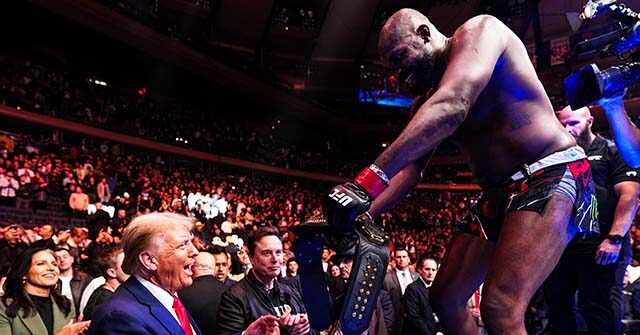In a highly anticipated showdown at Madison Square Garden, UFC heavyweight champion Jon Jones showcased his supremacy in the octagon by defeating former champion Stipe Miocic via technical knockout in the third round. After the decisive victory, a moment of political and cultural significance unfolded in the ring. Jones publicly expressed gratitude to President-elect Donald Trump, who was in attendance for the match. Following his win, Jones not only thanked Trump for his presence but also performed a celebratory gesture known as the “Trump dance,” which elicited laughter and commentary from the UFC’s renowned commentator, Joe Rogan. The victory was celebrated not just as a personal achievement for Jones but symbolized a fusion of sports and political allegiances in front of a raucous crowd.
With the energy of the audience palpable, Jones took center stage to deliver an impassioned speech shortly after his victory. He highlighted his sense of pride in being an American champion, reiterating his Christian faith as a significant aspect of his identity. His comments resonated with the packed arena, leading to loud applause and support from the fans. To amplify the patriotic atmosphere, Jones initiated a chant of “USA, USA, USA,” reflecting a sense of nationalism that has been a recurring theme in various sporting events in the United States. This moment not only solidified Jones’ status as a sports figure but also positioned him within the broader context of American identity and values.
After concluding his victorious speech, an important symbolic act occurred when Jones approached Trump, presenting him with his championship belt. This gesture served to further intertwine sports and politics, illustrating the connection between celebrity athletes and political figures. The handshake exchanged between Jones and Trump underscored the spectacle of the event, marking a moment that combined martial prowess with an endorsement of political leadership. This act went beyond a typical championship celebration; it reinforced a narrative of unity among those who share a common vision of sports, patriotism, and political engagement.
In addition to Jones and Trump, the event was attended by a host of notable personalities, adding to the aura of celebrity that surrounded the UFC fight night. UFC CEO Dana White was present alongside high-profile figures like Elon Musk, House Speaker Mike Johnson, and several others, including singer Kid Rock and former politicians Tulsi Gabbard and Robert F. Kennedy Jr. Their collective presence at the event illustrated the cross-section of politics and entertainment, as political leaders mingled with prominent figures from the sporting world and beyond. The attendance of such influential personalities contributed to the fight’s atmosphere, elevating it from a standard sports event to a culturally relevant occasion.
During the event, Trump also participated in the entertainment, dancing to the classic tune “YMCA,” which described an effort to engage the crowd and connect with the joyful, spirited environment of the occasion. This spontaneous act demonstrated Trump’s affinity for showmanship, embracing the celebratory atmosphere characteristic of both political rallies and sporting events. The combination of Jones’ in-ring victory and Trump’s light-hearted interaction with the audience helped create a memorable night that blurred the lines between sporting achievement and political spectacle.
Ultimately, Jones’ victory and his interaction with Trump underscored how sports can serve as a platform for expressing political sentiments and national pride. The unprecedented blending of UFC and political culture in this instance highlighted the growing trend of athletes becoming vocal participants in political discourse. Jones’ post-fight actions set a precedence not only for future fighters but for the relationship between public figures in sports and politics, showcasing an evolving landscape where victories inside the cage can ripple into broader societal conversations. The event at Madison Square Garden thus emerged as a multifaceted phenomenon encapsulating competitive glory, patriotism, and political allegiance.

